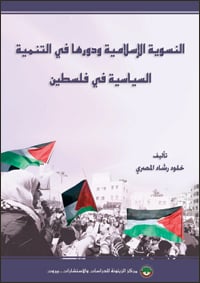Al-Zaytouna Centre has published a new book entitled The Islamic Feminism and its Role in the Political Development of Palestine, authored by Kholood Rashad Almasri.
The 112-page book is a thesis by which the author has acquired her Master’s degree in Women’s Studies at An-Najah National University in Nablus. Indeed, it is one of the few books covering the lack of studies on Palestinian Islamic feminist trend.
The study has adopted the historical method to analyze the chronological developments accompanying the feminist movement since its inception until the present time relying on the literature that has addressed feminist movement. The book employs this method as well to study the foundation of Islamic feminism and its impact on the track of the feminist movement. In addition, the descriptive analytical method has been used to address the issue fully.
With an introduction and two chapters, the book tackles the concept of feminism in the West, its inception and intellectual trends, which were the bases of feminist movements in their quest for defending the woman and advocating her social and political rights. It also mentions a few movements as examples, then displays the image of women in Western thought exploring religious origins and philosophers during different historical phases including the European Renaissance.
The book examines the “feminism” term from an Islamic perspective, and also discusses the “Islamic feminism” term, its inception and controversial name, and the Western impact on its labelling as the term is new and contemporary and provokes wide argument amidst Islamic circles.
The book addresses Islamic feminism in the Arab world and the active movement of women Islamists to embrace an important role in the 21st century. It also highlights the significant leaps achieved in the situation of women Islamists on the political level and their participation through elections in official political systems after the Arab spring.
The book concludes that Palestinian Islamic feminism has been able to impose itself on the Palestinian arena and institutional work as well as to enter the political system in harmony with the general Islamic feminist movement in the Arab countries.
The book advocates women to achieve more accomplishments and successes, and to overcome all internal and external challenges through all possible means.





Leave A Comment